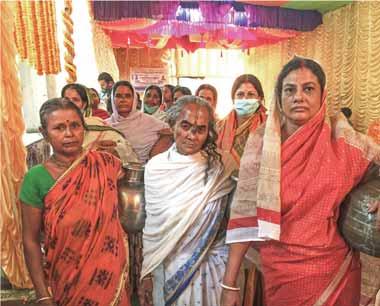
22 minute read
Rotary sponsors epilepsy surgeries in Pune
Rotary sponsors epilepsy surgery in Pune
Jaishree
Advertisement
A21-year-old married woman (name withheld on request) was sent back to her parents’ home in Osmanabad, Maharashtra by her husband’s family as she suffered from frequent seizures due to epilepsy. But today her father is a happy man despite the setback because she is totally cured following a brain surgery which was beyond his means. “No more seizures, and no more anti-epileptic drugs. My daughter can now live a normal, healthy life without fear and the doctor has said that she can even take a job,” he says. The family has put the failed marriage behind them.
For Appa Nimbargi of Akkalkot, Solapur, the surgery “brought reincarnation for my son. I am so happy that he can now be as normal like his other friends and without any fear of epileptic attacks.”
Thanks to RC Pune Baner, RID 3131, four epilepsy patients, including the above mentioned two, are cured of epilepsy. The club is all set to sponsor the life-changing surgical treatment for the fifth patient, an eight-year-old girl, soon.
These patients were identified for surgery following an epilepsy
From L: Rtn Vikram Jadhav, RC Pune Baner president Sanket Saraf and Rtn Satyanarayan Kabra with a young patient and her parents at the hospital ward.
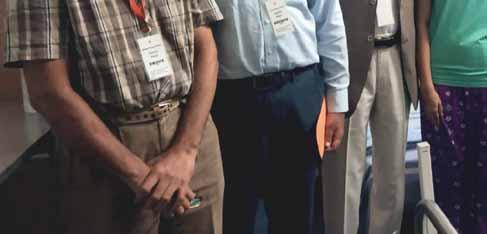

screening camp organised by the club in association with the Deenanath Mangeshkar Hospital in the city. “The four of them are cured for a long term. The doctor has certified that they can live a regular life like you and me,” says Sanket Saraf, president of this 11-year-old club with 40 members.
The club has signed an MoU with the hospital for providing surgical cure for less privileged epileptic patients at a subsidised cost which will be borne by the club.
It all began when neurosurgeon Dr Nilesh Kurwale was looking for support to break the barriers surrounding the treatment of epilepsy, a neurological disorder which causes abnormal brain activity resulting in seizures. “Often people are apprehensive about brain surgery. But it gives the most amazing cure for epilepsy and has an 80 per cent success rate. There is hardly much awareness about it, even among the medical fraternity,” says the doctor who heads the hospital’s neurology department.
With the Bajaj Foundation coming on board as sponsor, the hospital agreed to open an epilepsy centre
If clubs can organise epilepsy screening camps, or even talk about the surgery, people will certainly come forward to get their children cured of the disorder.
Dr Nilesh Kurwale neurosurgeon, Deenanath Mangeshkar Hospital, Pune
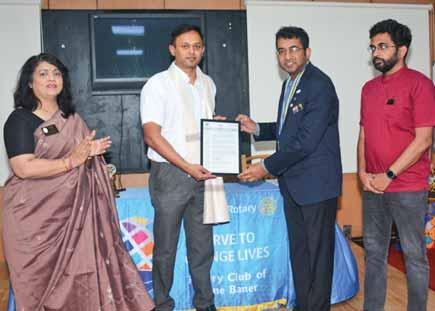
Neurosurgeon Dr Nilesh Kurwale receives the Vocational Excellence Award from club president Saraf in the presence of DGN Manjoo Phadke and Rtn Aniruddha Joshi.
there. He and his team of specialists perform around 150 such surgeries a year, says Surhuda Kulkarni, member of RC Pune Baner.
Only the screening procedure prior to the surgery is a lengthy process. “The surgery is not complicated and the patient will stop getting seizures from day one,” assures Dr Kurwale. Post-surgical follow up includes just three visits to the clinic, and “the patient is cured for life”. There is a wide belief among people that epilepsy can cure on its own. But it only hampers a person’s normal life, making him/her heavily drug dependent, he says.
The entire treatment costs around `3 lakh. People spend at least `2,000–3,000 a month for AEDs alone. Add to it the doctor visits, loss of earnings and the after-effects of the drugs. “Surgical treatment comes at a cost of two-and-a-half years of your medical treatment and it is safer and cheaper,” he claims.
The surgeon screened 25 patients at the camp and 12 were identified for surgery which will be sponsored by the club with the support of its corporate and individual donors. “Presently we have about `7 lakh earmarked for the treatment,” says Surhuda. The hospital also recommends patients to the club, which picks up the medical bills.
The estimated cost of treatment for the shortlisted patients is `2 crore and “we are progressing in phases depending on the availability of funds. We have all papers in place and donations are coming in,” assures Saraf. The club recently organised the ‘Walk for a cause’ to raise funds and awareness about the surgical cure for epilepsy.
“Rotary with its vast network of influential people can spread the good word just like how they took up congenital heart surgeries in a big way. If clubs can organise epilepsy screening camps, or even talk about the epileptic surgery, people will certainly come forward to get their children cured of the disorder. And it also helps as many Rotarians are also doctors. They have the reach and the capacity,” adds Dr Kurwale.
Lessons in nutrition for pregnant and lactating women
Kiran Zehra
She ate what we ate. Some dal, rice and vegetables whenever we could afford it,” says Mahalakshmi, mother of 18-monthold Varsha. “I had no idea she was not receiving enough nutrition until she had diarrhoea and we had to rush her to the hospital. My daughter weighed five kilos, while doctors said that she should weigh at least seven kilos.” Mahalakshmi’s family could not afford three meals a day and “buying fruits and vegetables was out of the question.”
She was introduced to the First 1000 Days programme, an integrated nutrition project of RC Bengaluru Platinum City (RCBPC), RID 3190, handled by a social worker from Surdenpura village in Rajanakunte, 28 km from Bengaluru. The comprehensive, household-based initiative aims to improve the nutritional status of pregnant and lactating women and children under two years of age. After 12 months of enrolling in the programme “Varsha looks healthy and active now and is gaining weight steadily,” smiles Mahalakshmi.
“The term ‘acute malnutrition’ or ‘severe wasting’ sounds alien to mothers from underprivileged and rural backgrounds in India. They not only lack nutritional knowledge, but have zero idea about how a mother’s malnutrition during pregnancy adversely affects her child’s survival, growth and development, and her access to nutrition,” says Dr Shobha G, a nutritionist, and member of RCBPC. When it comes to the health of mothers and infants, particularly in rural areas, “we must do beyond what PHCs and ASHA workers do.”
As a professor of Human Development at the VHD College of Home Science, Shobha came across the increasing issues of acute malnutrition in young mothers through a research programme carried out by her students. “I approached my club with the statistics and we began work on the project immediately.” The club launched the two-year initiative at Surdenpura with sponsorship support from MCKS Trust, a city-based charitable trust.
Nutri-milk being served to a young mother.
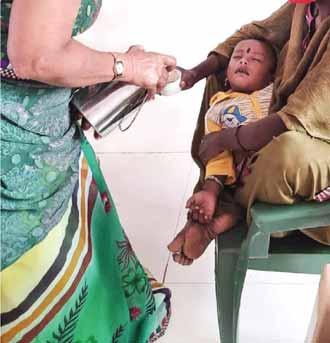
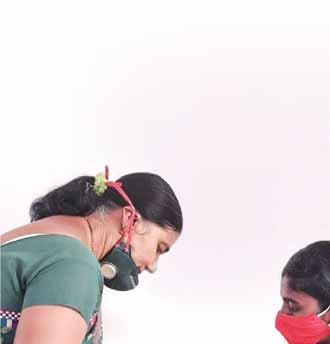
But women from the village weren’t convinced to join the programme. “This concerned their baby and they weren’t willing to risk anything,” says club president Nisha Bellare. With the help of People’s Trust, a local NGO, the club gained the trust of the rural community. To ensure the project’s sustainability, “we had to make sure that all the women participated in the classes regularly. So, we allowed the families of the pregnant women to attend the programme. They could bring their children, mother-in-law, or any family member to the classes. Sometimes we had the entire family of a participant come and see what we were doing.” she adds.
Shobha explained to them that the first 1,000 days of life provide a unique opportunity to establish the foundation for lifelong nutrition, health and development of their soon to-be-born babies. “My students created brochures about the programme in the regional language with a chart to measure neonatal milestones.” A food pyramid was also displayed to show how much of what should be eaten to achieve a healthy, balanced diet.
Shobha says that “50–55 per cent of both rural and urban women enter pregnancy in an anaemic state.” To address this issue the club partnered with Aspirar Sphere, an NGO that is addressing iron deficiency through its iron-rich chocolates. “I tested the efficiency of the chocolate myself,” quips Shobha who took a pre and post-chocolate consumption blood test to determine her iron level. “My iron level went up by 2 per cent in just one month. So, we began distributing the bite-sized chocolates to the mothers-to-be at Surdenpura.”
Next, the club partnered with the University of Agricultural Sciences, Bengaluru, to provide the women with monthly supply of nutritional
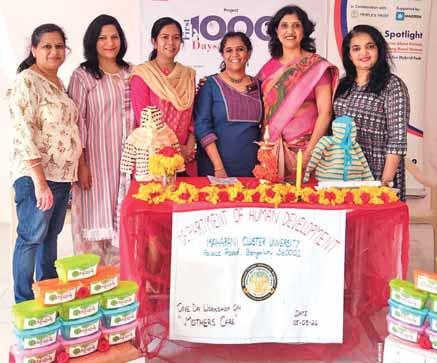
L to R: Club members Rachna Bhotika, Uma Khemuka, Dr Payel Biswas Soo, club president Nisha Bellare, club members Dr Shobha G and Upasana Singh at the inauguration of the project.
50–55 per cent of pregnant women in both rural and
urban areas are anaemic.
ladoos made with ghee, wheat flour, dried fruits and nuts. The university also gave them seeds and saplings (drumstick, guava, papaya, curry leaves, etc) of food that can be grown in the backyard of their homes. In association with the Mitu Foundation, Bengaluru, the club distributed woollen sweaters to the pregnant woman. A special awareness programme on breastfeeding was also conducted. A healthy recipe contest was held for these women and “we were surprised to see the number of things that can be made with something as simple as ragi,” says Shobha.
The programme includes complimentary nutritious meals for both mother and child, nutri-milk for the infants, sanitation and hygiene education, nutrition assessment, counselling, and support through a WhatsApp mothers’ group.
After the initial hesitancy the village women are now opening up to the team from RCBPC about various other issues they face at home. In a one-to-one session Shobha was shocked to know that “a girl as young as 19 was going to deliver her third baby, while another woman was forced by her husband to ask the doctor how soon after her delivery will she be able to have sex with her husband. She wept saying even in pain she had to oblige him. Although I advised her to voice her feelings strongly to her husband, I realised that more than counselling the women, we have to educate men to look beyond a woman’s body,” she added.
As members of the family of Rotary, we are people of purpose, people of influence and people of action. Each year, committees that support Rotary and The Rotary Foundation focus on putting Rotary’s strategic priorities into action, challenging us to increase our impact, expand our reach, enhance participant engagement, and increase our ability to adapt.
Would you like to contribute to Rotary’s success? We are searching for qualified Rotarians and Rotaractors to apply their leadership skills to serve on a committee in the 2023–24 Rotary year. These positions offer an opportunity for you to share your vocational expertise and skill set and help ensure diverse perspectives within each committee.
Apply Yourself
Candidates with areas of expertise as detailed in the chart are encouraged to apply. The number of openings is limited. If you are not selected this year, we encourage you to apply again next year.
All committees correspond via email and on virtual platforms, typically with one mandatory in-person meeting per year. Dual members of both Rotary and Rotaract are especially encouraged to apply.
To be considered for committee membership or recommend someone for an appointment, visit on.rotary.org/ application2022. Applicants must be registered on My Rotary at my.rotary.org and should make sure their My Rotary profile includes current contact information. Applications are due by August 15.
Area of Expertise Function on Committee Prerequisites
Audit Advise leadership on financial reports, internal and external auditing, and the system of internal control Independence, appropriate business exper- ience, and demonstrated financial literacy in accounting, auditing, banking, insurance, investment, risk management, executive management, or audit governance
Communications Advise leadership on communication with key audiences Professional background and experience in brand strategy, strategic planning, marketing, public relations, media, or a communications-related field
Finance Advise the RI Board on Rotary’s finances, including budgets, investment policy and sustainability measures Professional background in a financerelated field; nonprofit experience preferred. Candidates should have experience in financial matters at the club and district levels.
Learning Advise leadership on Rotary’s leadership training programme for Rotarians, clubs and districts with a special emphasis on training for district governors Significant training or education experience with a preference for leadership development
Operations Review Monitor the effectiveness, and implementation of operations and all internal systems; advise the Executive Committee on compensation matters; and perform other oversight functions as requested Experience in management, leadership development, or financial management, and a thorough knowledge of Rotary’s operations. Appointments are limited to past RI directors Openings & Commitment
One position for a six-year term
Two positions for three-year terms
Two positions for three-year terms
Two to four positions for three-year terms
One position for a six-year term
Area of Expertise Function Prerequisites Openings
Rotaract Advise leadership on matters related to Rotaract Rotarians: Experience working with Rotaract; direct experience as a mentor or Rotaract adviser or district chair. Rotaract alumni are strong candidates Rotaractors: Leadership at the club, district, or international level. Strong candidates who have served as a district Rotaract representative, organised projects, or attended a Rotaract Preconvention. Age restrictions may apply
Strategic Planning Review Rotary’s strategic plan and associated measures; advise leadership on other matters of long-term significance 10+ years of experience in strategy development, monitoring and implementation, and strong understanding of RI and Rotary Foundation programmes and services One to four positions for terms of varying length
Two positions with four-year terms
Serving can open doors for Rotary members Serving Rotary as an international committee member is a great way to gain global contacts and experience in your industry while using your professional skills to help the organisation. Previous leadership experience in Rotary isn’t required, just the skills and willingness to serve. Here’s how four Rotary members took a nontraditional path to gain international leadership experience.
Enedelsy Escobar-King Rotary Club of Panamá Norte, Panama;
Committee: Strategic Planning, 2020–24
Professional background I worked most of my professional life with the UN/UNICEF in positions where strategic planning was my bread and butter. My work experience took me to multiple continents. I thought I could be of use to Rotary, given that knowledge.
Rotary background I joined Rotary in 2015 and became very involved with project activities with my club, including playing an instrumental role in organising an Interact club in the secondary school I attended. Besides participating in several Rotary conventions, my experience has been at the club and district level. Why I was interested in international committee experience This opportunity allowed me to see the organisation from a different perspective. I got to know Rotarians from other districts, whom I otherwise might not have met.
Amanda Wendt Rotary Club of Melbourne, Australia
Since joining Rotary at age 26 in 2010, Amanda Wendt had been a club president, served as district public image chair, travelled with her district on a humanitarian trip to Cambodia, and spoken at a Rotary convention breakout and zone institute. But as far as formal leadership roles in Rotary beyond the district level, she had none.
“That quickly changed,” she says, when she became aware of the opportunity to serve on Rotary’s international committees after a chance conversation in 2017. “I jumped
at the opportunity to put my professional experience to use.” In her career, Amanda, a marketing and communications specialist, coaches entrepreneurs and leaders on building their brands. Since earning a bachelor’s degree in business, with an emphasis in marketing, in 2005, she has led marketing campaigns — producing social media, video and photography, digital content, advertising, and more. She has managed large-scale behaviour change programmes to achieve government policy reform, and she coaches organisations on attracting millennials as staff and customers.
Amanda decided to leverage her expertise by applying to serve on Rotary’s Communications Committee. She held that role for 2018–21 and served as the committee’s vicechair in 2019–20. “These opportunities to gain experience are far and beyond what most young professionals get to experience in their workplace,” she says. “It’s truly one of Rotary’s competitive advantages.”
Amanda says serving on the Communications Committee is one of her favourite Rotary experiences so far. She enjoyed the opportunity to work with and learn from members around the world, rolling out global initiatives while learning about cultural nuances and localised programme considerations. “It furnished me with experiences, skills, and a network that young professionals are eager to achieve but may be waiting some time to realise in their career,” she says.
Her time on the Communications Committee led to additional speaking opportunities on Rotary’s brand and communications as well as on connecting with younger members. Now she’s getting additional district leadership experience, too: She’s serving as 2022–23 governor of District 9800.
Vino Sookloll Rotary Club of Phoenix, Mauritius
Committee: Communications, 2020–23
Professional background I am a branding and innovation, design, and marketing communications consultant. I’ve been running my own agency for the last 40 years, and served as the president of the Association of Communications Agencies of Mauritius. Rotary background: I became a charter member of the Rotary Club of Phoenix in 2003. I have been leading major communications projects for my club and the district (9220) for many years. In addition to becoming a Communications Committee member, in 2020 I became an assistant Rotary public image coordinator for Zone 22.
Why I was interested in international committee experience: Joining the committee allowed me to bring my concerns about improving the tools available for building a public image to the people working on these issues at the international level. This year I am chairing the Building the Rotary Brand subcommittee. I feel at home, surrounded by passionate members. I hope those joining next year will share that same spirit of continuous improvement.
Bobbe Barnes Rotary Club of Fair Oaks Ranch, Texas
Committee: Audit, 2020–23
Professional background I worked with Price Waterhouse in Toronto, then moved to academia in the accounting programmes at the University of Texas and University of Colorado. I later moved to Central Asia and became the technical accounting expert for a USAID project, working with international and local experts to develop a training programme for accountants. The programme is ongoing.
Rotary background: I joined the Rotary Club of Bishkek, Kyrgyzstan, to expand my network and meet other local and expat leaders in the country. I became involved in the club by helping implement the financial aspects of the global grants we were awarded and serving as the liaison to the Rotaract club. After I returned home, I became a charter member of the Rotary Club of Fair Oaks Ranch.
Why I was interested in international committee experience: I wanted to serve beyond the club level in order to give Rotary what it had given me during my years overseas. I became involved in the district as a district treasurer and grants subcommittee chair. Then I saw that Rotary was calling for volunteers to serve on committees. I applied to serve on the Audit Committee as I found that best matched my expertise. ©Rotary
Dear district governors 2022–23, It must be a very exciting time for you now as you start your year as district governor of your respective districts. Your high level of enthusiasm will surely match your ambitious TRF goals and take Foundation to greater heights. Rotary leaders, including RI directors and trustee of our zones will be supporting you in your endeavours. The zone-wise team details are shared here for your reference
The Rotary Foundation Zonal Teams for RY 2022–23
RID Mahesh Kotbagi (Zone 4 & 7) RID AS Venkatesh (Zone 5 & 6) TRF Trustee Dr Bharat Pandya (Zone 4,5,6 & 7) Zone-4, EMGA Deepak Gupta Zone-4, EPNC Dr N Subramanian
Zone-4, RRFC TN Subramanian
Zone-5, EMGA R Madhav Chandran
Zone-5, EPNC Chinnadurai Abdullah
Zone-5, RRFC John Daniel
Zone-6, EMGA Rajiv Sharma Zone-6, EPNC Shyamashree Sen Zone-6, RRFC Basu Dev Golyan Zone-7, EMGA Suresh Hari
Zone-7, EPNC Bharath Kumar
Zone-7, RRFC Manjunath Shetty mahesh@kotbagihospital.com
venky.rotary@gmail.com
drbspandya@gmail.com
deepak_gupta41@hotmail.com
drnsubra@yahoo.co.in
rtn.subramanian@gmail.com
madhav.chandran@ymail.com
drchinnaduraiabdullah@gmail.com
rtn.johndaniel@gmail.com
rtnrajiv3030@gmail.com
shyamashreesen.rotary@gmail.com
bdg3292nepal@gmail.com
3190dgoffice2018@gmail.com
pdgbharath@yahoo.com
manjunathshettym@gmail.com
TRF-Area of Focus, Major Gift Initiative Committee members PDG Sunil Zachariah — Disease Prevention and Treatment PDG Ashok Panjwani — Support Environment
G’day, Melbourne

With the conclusion of the 2022 RI Convention in Houston on June 8 — Rotary’s first in-person convention since the start of the Covid-19 pandemic — attention now turns to next year’s host city, Melbourne, Australia.
The 2023 convention will take place May 27–31 inside the Rod Laver Arena and the Melbourne Convention and Exhibition Centre, which are located in vibrant riverfront precincts. This marks the second time Melbourne is hosting a Rotary Convention. The first was in 1993.
Melbourne is the coastal capital of the southeastern state of Victoria. It’s the second-largest city in both Australia and Oceania with a metro population of more than five million. Melbourne is also one of the world’s most culturally diverse cities. According to the city government, around 140 cultures are represented in Melbourne, from the Indigenous inhabitants to more recent migrants from Europe, Asia and Africa. Widely regarded as Australia’s cultural capital, Melbourne is a UNESCO City of Literature and is home to performing arts, live music venues and cultural attractions. The Economist Intelligence Unit has ranked Melbourne as one of the world’s most livable cities, based in part on its cultural attributes.
Mary Barry, past president of the Rotary Club of Melbourne, chairs the Host Organisation Committee. The Rotary Club of Melbourne was chartered in April 1921, the first in Australia. The country now has more than 1,000 clubs andnearly 25,000members. It has previously hosted four Rotary conventions, most recently in Sydney in 2014.
Learn more and register at convention.rotary.org.
Funding education of children of widows
V Muthukumaran
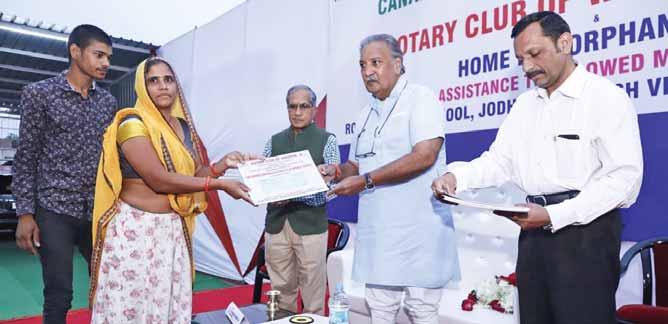
Gaj Singh, former Rajya Sabha MP, giving a cheque to a woman in the presence of project coordinator C P Sancheti (L) and past president Lavendra Singh (R).
After enduring the daily grind, hardships and turmoil, Vandana Acharya (45), a widow and mother of Class 8 boy Mayank, is able to heave a sigh of relief and can even smile a bit. For, she is a beneficiary of an Assistance to Widows Programme (AWP) of RC Jodhpur, RID 3053, which is presenting cheques to widowed mothers of students to cover their school fees and other educational expenses. “I shudder to think what would have happened to me and my son if Rotary has not intervened with this cash grant at a very critical time of our lives. We are forever indebted to Rotary,” says Vandana.
So far, 750 beneficiaries in Jodhpur have availed the cash assistance valued at around `80 lakh over the last 10 years. AWP coordinator CP Sancheti who initiated the project with the support of RC Windsor, RID 6400, Canada, and its affiliated Canadian World Education Foundation (CWEF), a global NGO, goes down memory lane to recall the way AWP crystallised in August 2011.
Instant rapport
An elderly couple, Om Chandna and his wife, from Canada were touring Rajasthan in March 2011. They were looking for help to shift their luggage from the platform to the train coach at the Jaipur Railway Station as they were going to Jodhpur. Kapil Sancheti, son of project coordinator, who was about to board the same rail carriage helped the couple with their luggage. While travelling with them, he noted that Chandna was having a Rotary pin on his lapel and informed him that his father too was a Rotarian, a member of RC Jodhpur. “Kapil invited the couple, members of RC Windsor, to our house in Jodhpur. I took them to our club and around some of our projects — Rotary School, Rotary Circle and other community initiatives being done by us,” says Sancheti.
Chandna was elated to see the multifarious projects being done in Jodhpur and expressed his wish to do a joint programme with our club. “After
a few months, Chandna informed me from Canada about the cash assistance programme his club was doing for widowed mothers of students at various schools in India and Kenya,” recalls Sancheti. He wanted to fund widowed mothers in Jodhpur who were struggling to educate their children through the CWEF. Already, the NGO was providing grants to mothers of 1,300 students in India each year at that time, Aug-Sep 2011, in a joint endeavour with RC Windsor.
The first grant
Following paper work and other formalities to kickstart the AWP, the NGO provided `2 lakh for widowed mothers of 31 children studying at the Rotary School, Jodhpur, in 2012–13. “We continued this for four years till 2016, when Chandna wanted to enlist more schools in the programme. We then added 16 Adarsh Vidya Mandirs. Each year, we are giving cheques worth `10–12 lakh I shudder to think what
would have happened to me and my son if Rotary has not intervened with this cash
grant at a very critical time of our lives. We are forever
indebted to Rotary.
Vandana Acharya a beneficiary
to widowed mothers,” explains Sancheti. Both the Rotary club and Adarsh schools are contributing 10 per cent of the total annual grant which is deposited in an AWP bank account.
Through CWEF, the Jodhpur club funds children till they finish their higher education. “The cheques from Rotary are a great boon for my daughter, Kusum, studying in Class 4. I am confident of a bright career for her, and her college education will also be funded by them,” says Suraj Kanwar (35).
A chartered accountant-turnedgranite entrepreneur, Sancheti (72) is the chairman of 32-year-old Navjyoti Manovikas Kendra, a school for differently-abled with a strength of 104 children. “We run two colleges offering two-year diploma and B Ed courses for training teachers for this special school.” In 1997–98, he set up an ICU with four beds (`8.5 lakh) at the Mahatma Gandhi Hospital, Jodhpur, in memory of his late mother Madan Kanwar Sancheti, and a few years later, added another ICU with six beds (`15 lakh) adjacent to the existing unit. “I felt happy to motivate my relatives to set up three ICUs and two acute care wards, all worth `1 crore, at two government hospitals,” he says.
Drinking water for villages in the Sundarbans
RC Calcutta New Alipore, RID 3291, has installed a mini water treatment plant to supply purified drinking water at the Dakshin Akhratala village in the Sunderbans, West Bengal. The plant, that can purify 1,000 litres of water an hour, has 10 taps to provide pure drinking water to more than 300 families. The project was a joint collaboration with Ncourage Social Enterprise Foundation, a subsidiary of Tata Chemicals, and Maa Saroda Women & Rural Welfare Society of Sandeshkhali, an NGO working for people in the Sundarbans. The project was inaugurated by DG Prabir Chatterjee.
Team Rotary News
